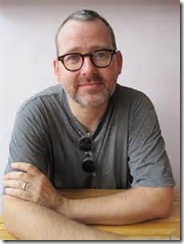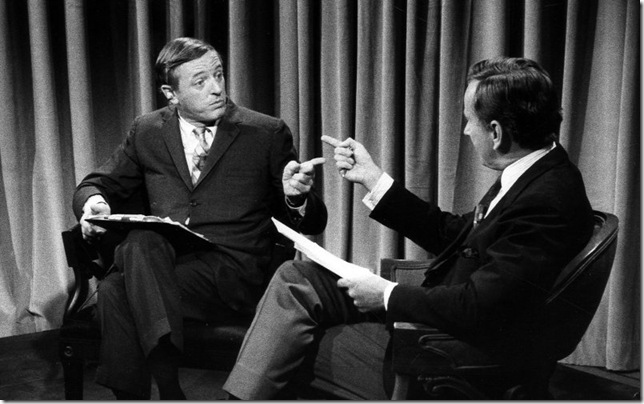The year was 1968, a turning point for American politics as well as for the way the three television networks covered politics and the political party conventions.
ABC News, invariably third in the ratings, took the bold move of not broadcasting gavel-to-gavel coverage, in favor of a 90-minute summary of the Republican and Democratic confabs, plus a half-hour nightly analysis of what happened that day.
Included in that analysis was a debate segment between two articulate and increasingly heated patrician intellectuals, conservative William F. Buckley and liberal Gore Vidal. In their new documentary, The Best of Enemies, co-directors and writers Morgan Neville and Robert Gordon look back on those debates, arguing that they marked the beginning of the end of civilized, objective television news coverage.
“I think it was definitely one of those catalytic moments that changed TV news,” says Neville, an Oscar winner in 2014 for his documentary feature on back-up singers, 20 Feet From Stardom. “And it basically showed networks that they could get ratings by having people be really mean to each other.
“I think ABC wanted sparks, but I don’t think they were expecting an inferno,” he now says. “They wanted something that was going to be attention-getting and maybe have some friction, but in the moment ABC was kind of embarrassed. It wasn’t until the ratings came out that they realized what they had created. I think it was more than they bargained for.”
The Best of Enemies was featured in this year’s Miami International Film Festival, which Neville attended to gain pre-release attention for the documentary. It opens in theaters locally this month — today in Miami and Boca Raton, and on Sept. 11 in Lake Worth.
The two debaters were a study in contrasts, in terms of the way they prepared for these debates. “I think really Vidal came in with a plan,” explains Neville. “He had done his opposition research and I think Buckley just thought, ‘Oh, I’ll disarm him with my wit.’ He had a weekly TV show (Firing Line) and he got by each week on his wits.”
As the film shows, the vitriol between Buckley and Vidal was no act. It was “very real,” notes Neville. “They had hated one another for a number of years, much more than just ideologically. In 1962, Vidal had been on the Jack Paar show, making fun of Buckley, and Buckley wrote an angry letter to Jack Paar demanding that he go on to clear his name. Paar let him on and that was really the first time Buckley got national TV time.”
 Neville was 1 year old in 1968, so he does not claim to remember the debates personally, but he did have a personal connection to Vidal. “My first job after college was working at ‘The Nation’ magazine, and I was assigned to be Gore Vidal’s fact checker,” the documentarian explains. “He was writing essays for the magazine. It was a brutally difficult job. Vidal was very accurate, but everybody occasionally gets little thing wrong and I’d have to tell him this and he really didn’t like to be told he was ever wrong.”
Neville was 1 year old in 1968, so he does not claim to remember the debates personally, but he did have a personal connection to Vidal. “My first job after college was working at ‘The Nation’ magazine, and I was assigned to be Gore Vidal’s fact checker,” the documentarian explains. “He was writing essays for the magazine. It was a brutally difficult job. Vidal was very accurate, but everybody occasionally gets little thing wrong and I’d have to tell him this and he really didn’t like to be told he was ever wrong.”
Still, it was Gordon who first had the idea for the film and brought it to Neville to collaborate. “A friend of his, an English professor, had gotten a copy of the debates and had shown them at a class of his and got a tremendous reaction,” says Neville. “He decided to do another screening at the university and Robert went to that screening. And everyone stayed around and argued afterwards, so that was the nugget of the idea.”
They began conducting interviews in 2010, including one with Vidal, which was ultimately not used in the final film. “Gore was very difficult, defensive. He accused us of being Buckleyites,” says Neville. “Gore in his later years was fairly paranoid. Being asked about Buckley over and over I think just really got his ire up. He had zero perspective on it. He was still in the fight.
“To him, he had decimated Buckley and that’s all there was to say. So when we tried to get into some of the arguments, he found it kind of infuriating.”
As to who actually won those debates, Neville says it depends on how you look at it. “I guess the really productive way of looking at it is that Vidal won the battle and Buckley won the war. By the rules of debate, Vidal came off more the victor because he’s the one who kept his cool. But Buckley, ultimately, his ideas informed the American landscape, brought on the Reagan revolution.”
No matter how you score the debates, the film’s point is that the American people ultimately lost.
“To me that’s something I care a lot about, what it’s meant to the media. If you look at network news before this, it was very polite. You didn’t have people going for the throat at all. The sense of decorum was much higher. And today we have more channels with less substance, more voices that babble on.”
It would be hard to make the case that the Vidal-Buckley debates had much effect on the 1968 presidential race. (Richard Nixon beat Hubert Humphrey, by the way.) But it did change the way television covers politics. ABC’s decision to forgo gavel-to-gavel coverage put the network “certainly ahead of the curve. And it was a success for them,” says Neville. “Did the public win? I really don’t think so.”
